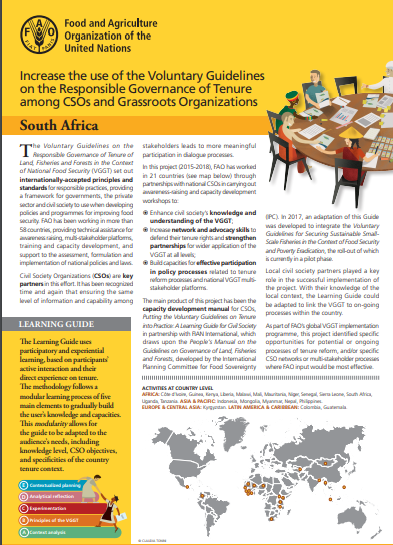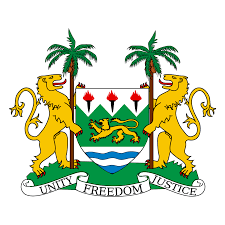Focal point
Location
The Food and Agriculture Organization of the United Nations leads international efforts to defeat hunger. Serving both developed and developing countries, FAO acts as a neutral forum where all nations meet as equals to negotiate agreements and debate policy. FAO is also a source of knowledge and information. We help developing countries and countries in transition modernize and improve agriculture, forestry and fisheries practices and ensure good nutrition for all. Since our founding in 1945, we have focused special attention on developing rural areas, home to 70 percent of the world's poor and hungry people.
Members:
Resources
Displaying 546 - 550 of 5074Increase the use of the Voluntary Guidelines on the Responsible Governance of Tenure among CSOs and Grassroots Organizations - Mongolia
The Voluntary Guidelines on the Responsible Governance of Tenure of Land, Fisheries and Forests in the Context of National Food Security (VGGT) set out internationally-accepted principles and standards for responsible practices, providing a framework for governments, the private sector and civil society to use when developing policies and programmes for improving food security.
Increase the use of the Voluntary Guidelines on the Responsible Governance of Tenure among CSOs and Grassroots Organizations - Indonesia
The Voluntary Guidelines on the Responsible Governance of Tenure of Land, Fisheries and Forests in the Context of National Food Security (VGGT) set out internationally-accepted principles and standards for responsible practices, providing a framework for governments, the private sector and civil society to use when developing policies and programmes for improving food security.
Increase the use of the Voluntary Guidelines on the Responsible Governance of Tenure among CSOs and Grassroots Organizations - Uganda
The Voluntary Guidelines on the Responsible Governance of Tenure of Land, Fisheries and Forests in the Context of National Food Security (VGGT) set out internationally-accepted principles and standards for responsible practices, providing a framework for governments, the private sector and civil society to use when developing policies and programmes for improving food security.
Increase the use of the Voluntary Guidelines on the Responsible Governance of Tenure among CSOs and Grassroots Organizations_South Africa
The Voluntary Guidelines on the Responsible Governance of Tenure of Land, Fisheries and Forests in the Context of National Food Security (VGGT) set out internationally-accepted principles and standards for responsible practices, providing a framework for governments, the private sector and civil society to use when developing policies and programmes for improving food security.
Increase the use of the Voluntary Guidelines on the Responsible Governance of Tenure among CSOs and Grassroots Organizations_Sierra Leone
The Voluntary Guidelines on the Responsible Governance of Tenure of Land, Fisheries and Forests in the Context of National Food Security (VGGT) set out internationally-accepted principles and standards for responsible practices, providing a framework for governments, the private sector and civil society to use when developing policies and programmes for improving food security.











